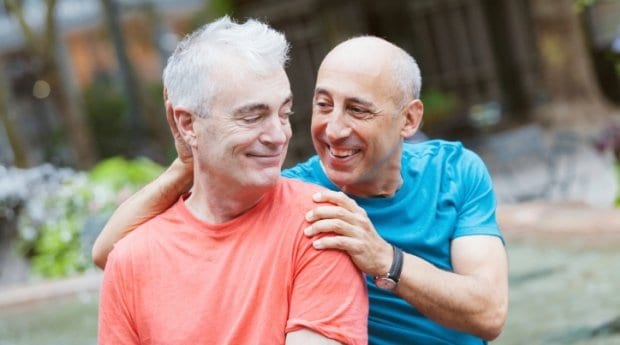End-of-life planning. Those five syllables alone are scary, and that fear often overrides the conversations that should be happening. The need for these discussions is even more important in the lesbian, gay, bisexual, transgender community, and on March 14, it was front and centre at the 519 Church Street Community Centre.
“It’s really not working,” says Brian de Vries of ignoring end-of-life planning. A professor of gerontology at San Francisco State University, de Vries and Gloria Gutman, from the gerontology department at Simon Fraser University, are the principal investigators of the Fostering End-of-Life Conversations, Community and Care among LGBT Older Adults study.
The research team released the initial findings of the study at a town hall at The 519. The study is a three-part, national project that included focus groups of people 60 years of age or older who identify as LGBT in Toronto, Vancouver, Edmonton, Montreal and Halifax. The other two components for the study are town hall meetings and the creation of an informational website that provides an environment to share.
Steven Mock, assistant professor in the department of recreation and leisure studies at the University of Waterloo, is the local research lead. Joining him is Celeste Pang, a PhD student in the department of anthropology at the University of Toronto. Pang put together The Toronto LGBT End-Of-Life Resource Inventory which was given out at the town hall.
The study began last April, with all of Toronto’s four focus groups taking place at The 519. The project will wrap up during May, with some additional research papers planned.
Three major themes emerged from these focus groups. One was concern over “Who will be my voice?” The question is not surprising, as LGBT people are more likely to live alone, and less likely to have a partner or children. LGBT seniors leaning on their friends for support becomes a common scenario.
“Friends don’t have formal roles in our lives,” de Vries says. “Which has complications when they are the people we turn to in support.”
For instance, friends are often not recognized in health care settings and don’t qualify as next of kin. This dependency led into the next theme: concern over friend and family contact — the notion that these people have their own lives and can’t be responsible for yours.
Lastly, aging issues not specific to the LGBT community, like failing health and finances, were also common concerns.
There was also some overlap between the groups: gay men and transgender people both spoke of the need for education on the part of service care providers; lesbians and transgender people spoke of the heteronormativity of the healthcare system; and gay men and lesbians shared concerns over LGBT community organizing and the need to step up.
Perhaps even more insightful are the unique observations of LGBT seniors in Toronto. Gay men observed that they haven’t set up good support networks, that they’re holding onto the cruising culture and that many are still looking for Prince Charming — or “buying” one. Lesbians spoke about the difficulties of meeting other lesbians, and transgender people mentioned the impact of government policies that lead to feelings of shame, guilt and fear.
Rod Lightheart took part in the focus groups and spoke at the town hall. “It hit home hard and fast and furious,” he says of the themes covered.
Lightheart, 63, says his partner of 15 years recently dumped him and that this, coupled with his health problems, has put things into perspective. He encourages all LGBT seniors to get their powers-of-attorney in order. “People don’t like to talk about this. You have to force them.”
While de Vries may not use the same language, the sentiment is there.
“It’s never too late to plan ahead, nor is it ever too early.”


 Why you can trust Xtra
Why you can trust Xtra


